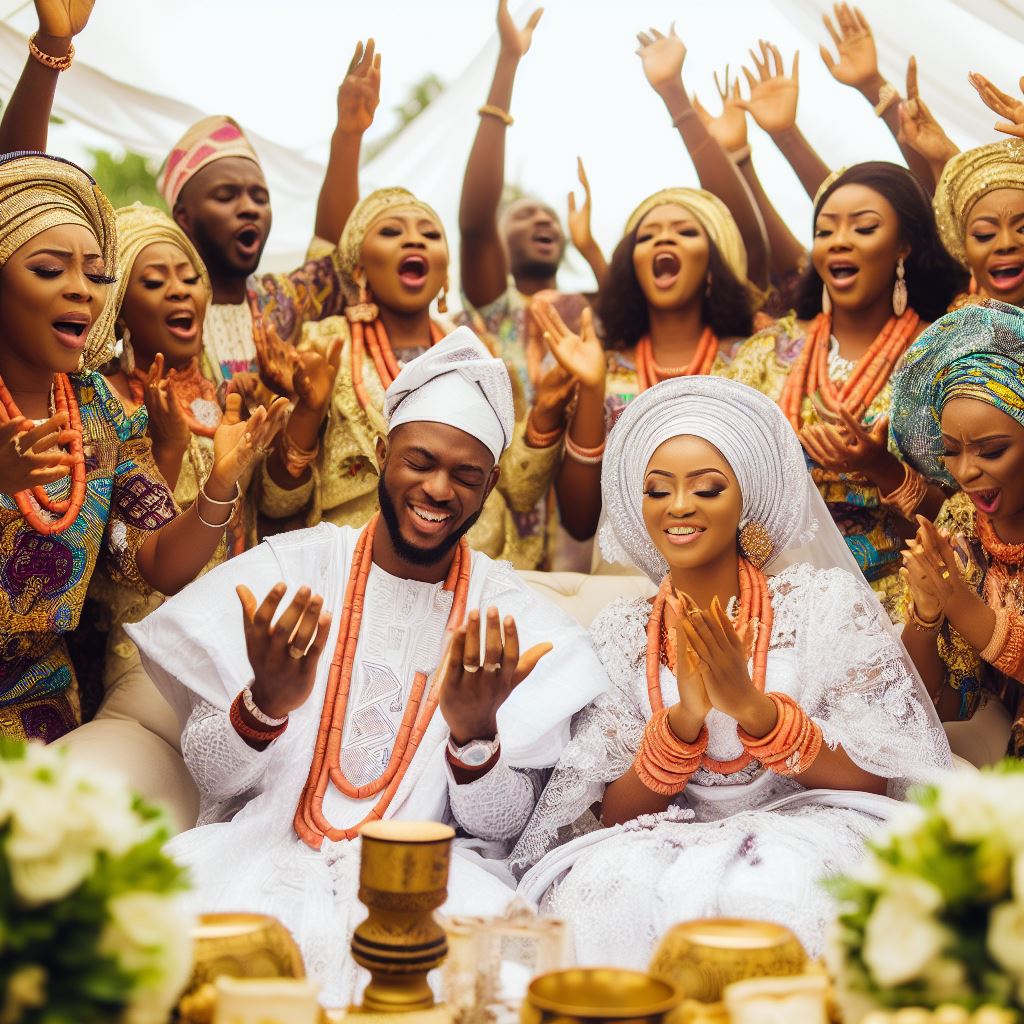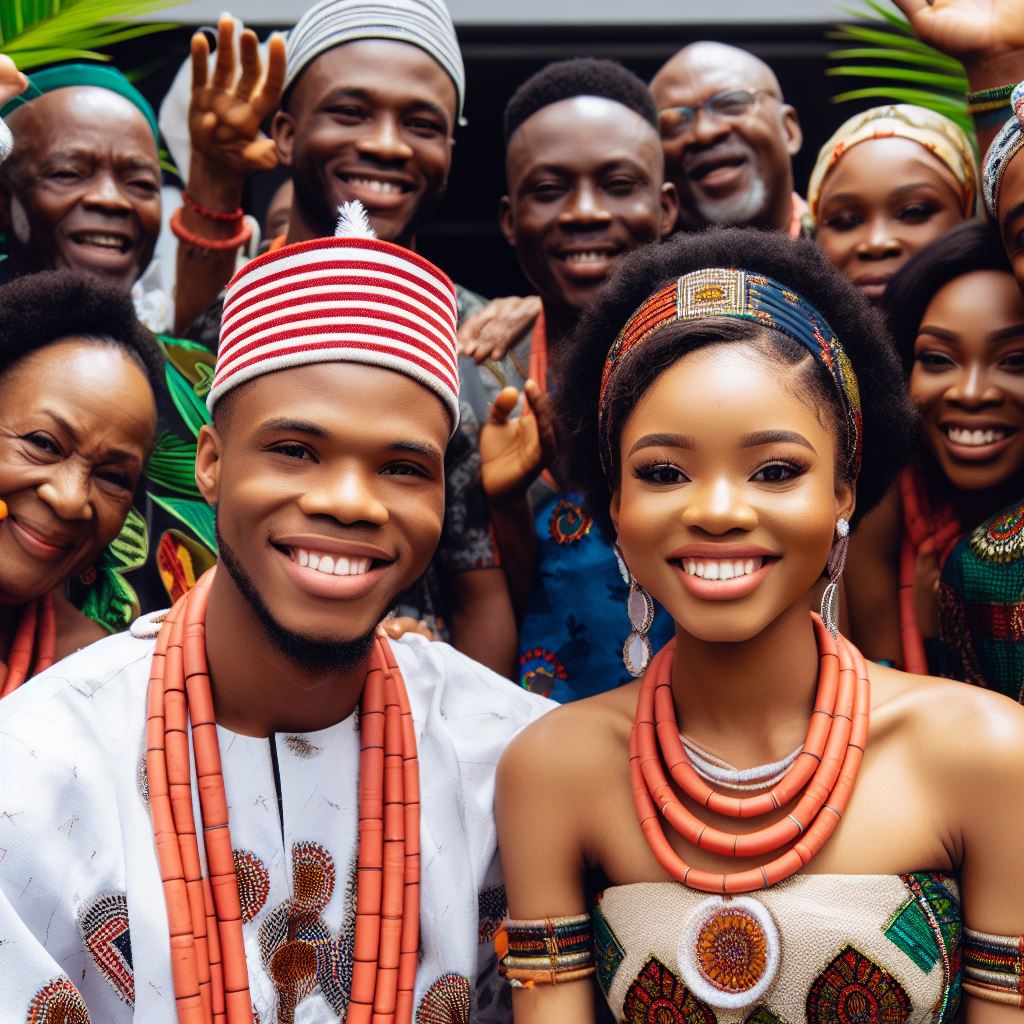Introduction
A. Brief overview of Nigerian marriages
Nigerian marriages are a reflection of the rich cultural heritage of the diverse ethnic groups within the country.
With over 250 ethnic groups, each with its unique traditions and customs, Nigerian marriages showcase a wide range of cultural practices.
These customs are deeply rooted in the Nigerian society and hold great importance in shaping the institution of marriage.
B. Importance of family messages in Nigerian culture
Within the Nigerian cultural context, family messages play a vital role in shaping marriage decisions and dynamics.
Family members are highly influential in determining the suitability of a potential partner, often intervening in the selection process and offering guidance to ensure a successful match.
These family messages convey expectations, values, and experiences that carry significant weight in shaping the course of a Nigerian marriage.
C. Thesis statement
Furthermore, family messages contribute to the development and maintenance of social networks within Nigerian communities.
Through these messages, families establish alliances, strengthen bonds, and promote social cohesion.
The exchange of messages ensures that individuals remain connected to their extended families, providing support, and fostering a sense of belonging within the marriage.
In this section, we will delve deeper into the role of family messages in Nigerian marriages.
We will examine how these messages influence partner selection, marital expectations, and the overall dynamics of marriage.
Through an exploration of real-life experiences and cultural perspectives, we aim to gain insights into the significance of family messages and their impact on the success and longevity of Nigerian marriages.
Cultural Significance of Family Messages
A. Traditional values and customs
Traditional values and customs play a crucial role in Nigerian marriages.
These values and customs are deeply rooted in the culture and history of the country.
They provide a strong foundation for family messages and decision-making processes.
Values such as respect, honor, and obedience are highly regarded and upheld.
Customs like dowry payment, matchmaking, and parental consent are essential in marriage negotiations.
B. Emphasis on collective decision-making
In Nigerian marriages, family messages are not solely dictated by individuals but involve collective decision-making.
Decisions regarding marriage proposals, dowry, wedding ceremonies, and other important matters are made as a family.
Each member’s opinion and input are considered and taken into account.
This collective decision-making process promotes unity and strengthens family bonds.
It also ensures that everyone feels valued and has a sense of belonging in the family.
C. Influence of extended family members
In Nigeria, extended family members play a significant role in family messages and marriage decisions.
Uncles, aunts, grandparents, and cousins all have a say and contribute to the decision-making process.
The opinions and suggestions of these extended family members are highly valued and respected.
They provide guidance, wisdom, and support to the couple, ensuring a harmonious and successful marriage.
The involvement of extended family members enhances the strength and stability of Nigerian marriages.
D. Role of elders in imparting family messages
Elders, especially parents and grandparents, hold immense respect and authority in Nigerian marriages.
They are the custodians of traditions, values, and knowledge, and are responsible for imparting family messages.
The wisdom and experience of elders guide the younger generation in making important life decisions.
They provide valuable advice, resolve conflicts, and mediate disputes to ensure the well-being of the family.
Their role in imparting family messages strengthens the bond between generations and preserves cultural heritage.
In essence, the cultural significance of family messages in Nigerian marriages is profound.
Traditional values and customs, collective decision-making, the influence of extended family members, and the role of elders all contribute to the strength and success of these marriages.
Understanding and honoring these cultural aspects are vital for couples navigating the complexities of Nigerian marital relationships.
Family Messages and Mate Selection
A Blessing or a Burden? Family messages:
Family messages in Nigerian marriages have both positive and negative aspects.
On one hand, they provide a solid support system and ensure the preservation of cultural customs and traditions.
On the other hand, they can also be restrictive, limiting individuals’ freedom to choose their own partners.
A. Arranged marriages and the role of family messages
When it comes to arranged marriages, the role of family messages becomes even more significant.
It is believed that parents’ wisdom and experience can lead to better mate selection for their children.
Their messages act as a compass, guiding young individuals towards suitable life partners.
B. Expectations and preferences communicated through family messages
The communication of expectations and preferences through family messages is crucial.
It allows parents to ensure their children marry someone who can support and provide for them.
These messages also help avoid potential cultural clashes or disputes.
C. Assessing compatibility based on shared family values
Furthermore, compatibility is considered paramount in Nigerian marriages.
Family messages emphasize the importance of shared family values, as they are believed to foster a strong foundation for a successful marital union.
By aligning values, individuals can better understand and respect each other’s perspectives, leading to a harmonious relationship.
D. Influence of family messages on the success of the marital union
However, the influence of family messages should not be underestimated.
They can place immense pressure on couples, forcing them to conform to societal and cultural expectations.
These expectations can be burdensome, overshadowing individual desires or preferences.
The success of Nigerian marriages relies on navigating the complexities of family messages.
Couples must strike a balance between honoring tradition and fostering personal happiness.
They need to communicate openly and honestly with their families, expressing their own desires while respecting their parents’ wishes.
Therefore, family messages play a significant role in Nigerian marriages.
They guide mate selection, communicate expectations and preferences, and assess compatibility based on shared family values.
While they can provide stability and cultural preservation, they can also be challenging to navigate.
Couples must find a way to maintain their individuality and happiness while respecting their families’ wishes.
Ultimately, the success of a marital union depends on open communication and mutual understanding between couples and their families.
Read: The Journey from Wedding Day to Years of Unity in Nigeria
Family Messages and Marital Roles
A. Gender roles and expectations dictated by family messages
Throughout Nigerian society, family messages play a significant role in shaping gender roles and expectations within marriages.
These messages are often passed down from generation to generation, reinforcing traditional notions of masculinity and femininity.
From an early age, boys are taught to be strong, assertive, and dominant, while girls are taught to be nurturing, submissive, and obedient.
These messages are ingrained in Nigerian culture and strongly influence marital dynamics.
B. Division of labor within the household
Family messages also dictate the division of labor within the household.
Men are often expected to be the primary breadwinners, while women are expected to take care of the home and children. These roles are reinforced through societal expectations and family messages.
Men are encouraged to focus on their careers, while women are expected to prioritize their domestic responsibilities.
This division of labor can create a power imbalance within marriages, with men having more authority and decision-making power.
C. Impact of family messages on marital dynamics
The impact of family messages on marital dynamics is profound.
Couples often find themselves conforming to these predetermined roles, leading to traditional and predictable patterns of behavior.
Women may feel pressured to sacrifice their career ambitions or personal goals in order to fulfill their domestic roles.
This can lead to feelings of frustration, discontentment, and a sense of unfulfillment.
Men, on the other hand, may feel overwhelmed by the burden of financial responsibility and may struggle to adequately balance work and family life.
These dynamics can create tension, resentment, and frustration within marriages.
D. Shaping the behavior and responsibilities of spouses
Family messages shape the behavior and responsibilities of spouses in Nigerian marriages.
They create expectations and norms that spouses feel obligated to adhere to, often at the expense of their individual desires and aspirations.
Wives may suppress their own needs and desires to prioritize their spouses’ needs and maintain harmony within the family.
Husbands may feel pressured to fulfill societal expectations, leading to high levels of stress and limited emotional expression.
In fact, family messages play a critical role in shaping gender roles, division of labor, and overall marital dynamics within Nigerian marriages.
These messages reinforce traditional societal norms and expectations, often resulting in the sacrifice of individual aspirations and desires.
It is important for couples to critically examine and challenge these messages in order to create healthier, more equitable relationships.
Read: Understanding the Deep Meaning of Marriage Messages

Family Messages and Conflict Resolution
A. Techniques learned through family messages
Family messages provide valuable insights into conflict resolution techniques for Nigerian marriages.
Effective communication, active listening, and problem-solving skills are examples of techniques learned.
Understanding the importance of compromise and negotiation enhances conflict resolution abilities.
Family messages serve as a foundation for effective conflict resolution in marital relationships.
B. Support and guidance provided by both families during conflicts
Family messages play a vital role in shaping the support and guidance offered during conflicts.
Both the bride and groom’s families act as sources of wisdom and encouragement in marital conflicts.
Family messages provide a sense of unity and reassurance during challenging times.
Parents and extended family members offer advice, mediate discussions, and promote understanding.
C. Challenges of conflicting family messages and its impact on couples
Conflicting family messages can create tensions and difficulties within Nigerian marriages.
Confusion arises when both families have different expectations, beliefs, and values.
The impact of conflicting messages can lead to misunderstandings, resentment, and marital strain.
Couples may experience stress as they navigate the conflicting demands of their families.
D. The role of compromise and negotiation in resolving differences
Compromise and negotiation are essential skills for resolving conflicts arising from conflicting family messages.
Couples must find common ground and make mutually beneficial decisions
Open and honest communication helps couples address differences and find solutions that satisfy both families
Through compromise and negotiation, couples strengthen their marriage while bridging the gap between family expectations.
Effective communication, active listening, problem-solving, and understanding the importance of compromise and negotiation are among the valuable techniques acquired.
These techniques serve as foundations for resolving conflicts, promoting understanding, and maintaining harmony within the marriage.
Both the bride and groom’s families play a crucial role in providing support and guidance during conflicts.
Parents and extended family members offer advice, mediate discussions, and promote understanding between the couple.
By upholding family messages, they foster a sense of unity and reassurance during challenging times.
However, conflicting family messages present challenges that can impact the couple’s relationship.
When families have different expectations, beliefs, and values, tensions and difficulties arise.
The clashing messages can lead to misunderstandings, resentment, and strain in the marriage.
Couples face the stress of trying to meet the conflicting demands of both families, leaving them torn and overwhelmed.
To overcome these challenges, compromise and negotiation become vital in resolving differences. Couples must find common ground and make mutually beneficial decisions.
In essence, family messages greatly influence conflict resolution in Nigerian marriages.
They provide techniques for effective resolution, support and guidance during conflicts, and present challenges when conflicting messages arise.
By prioritizing compromise and negotiation, couples can navigate the complexities of conflicting family messages, leading to stronger marriages and harmonious relationships.
Read: Traditional Nigerian Wedding Messages and Meanings
Adjusting Family Messages in Modern Nigerian Marriages
A. Influence of Globalization and Shifting Societal Values
Globalization and changing societal values have a profound impact on Nigerian marriages.
These factors introduce new ideas and concepts that challenge traditional family messages.
Couples need to adapt and navigate through these changes to maintain a harmonious relationship.
B. Balancing Traditional Family Messages with Individual Aspirations
Modern Nigerian couples face the challenge of balancing traditional family expectations with their personal aspirations.
Individuals now prioritize personal growth, career advancement, and self-expression alongside familial obligations.
Finding a middle ground between these two sets of values is crucial to maintaining marital satisfaction.
C. Challenges Faced by Couples in Reconciling Differing Family Messages
Differing family messages can strain the dynamics of a Nigerian marriage.
Conflicting expectations from both sides often lead to misunderstandings and conflicts.
Couples must learn how to effectively manage these differences to avoid resentment and marital dissatisfaction.
D. Strategies for Effective Communication and Understanding
- Open Dialogue: To navigate the complexities of family messages in Nigerian marriages, effective communication is essential.
- Open Dialogue: Couples should openly discuss their family expectations and aspirations.
- Active Listening: Each partner must actively listen to understand and empathize with the other’s perspective.
- Compromise: Finding common ground and reaching compromises can help bridge the gap between conflicting family messages.
- Mutual Respect: Respecting each other’s values and opinions fosters a healthy and harmonious marriage.
- Seeking Mediation: In cases of persistent conflicts, seeking professional mediation can offer guidance and support.
By employing these strategies, Nigerian couples can successfully adjust family messages and create a strong marital bond.
Understanding the influence of globalization, balancing traditional and individual aspirations, and effectively communicating are key elements in navigating the complexities of family messages.
This will result in a fulfilling and enduring marriage.
Read: The Symbolism Behind Nigerian Marriage Rings Explained
You Might Also Like: Challenges and Joys: The Meaning of Marriage in Nigeria
Learn More: The Essence of Marriage: Quotes from Nigerian Elders
Conclusion
The role of family messages in Nigerian marriages cannot be underestimated. Family messages serve as a foundation for marital success and happiness.
They guide couples on how to navigate various challenges and obligations within the marriage.
Understanding and respecting family messages is vital in Nigerian marriages.
It promotes harmony, unity, and mutual understanding between couples and their respective families.
By respecting these messages, couples show reverence to their cultural heritage and strengthen their marital bond.
It is essential for couples to continue exploring and appreciating Nigerian cultural values in their marriages.
This exploration helps to preserve their cultural heritage and customs, ensuring they are passed down to future generations.
It also fosters a sense of belonging and identity within the marriage.
Therefore, it is crucial for couples entering into Nigerian marriages to embrace and incorporate family messages into their marital journey.
By doing so, they can build a strong foundation, cultivate a harmonious relationship, and experience lasting happiness in their union.




